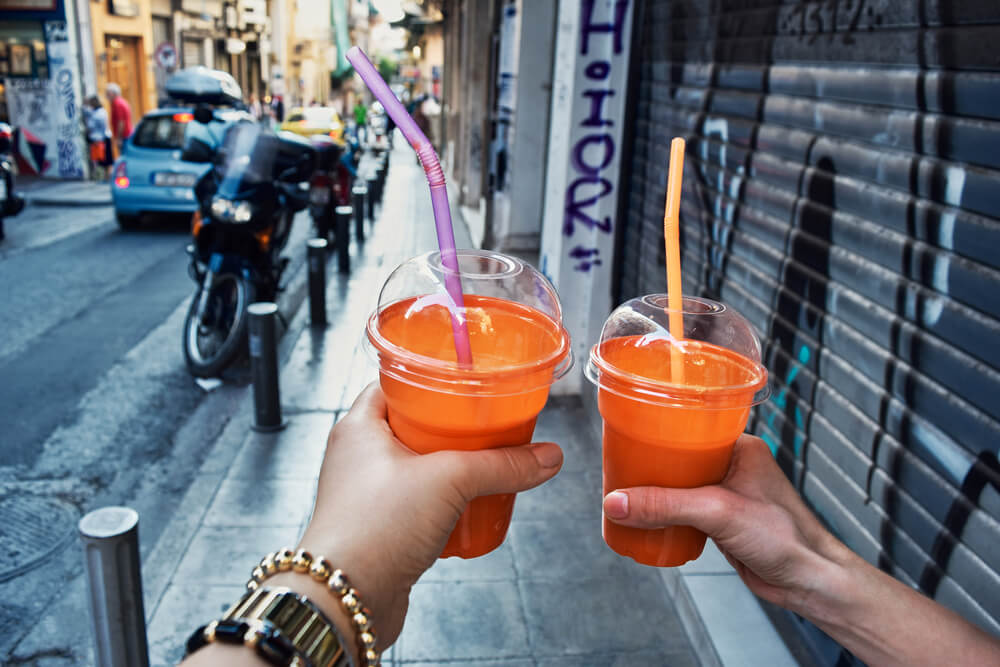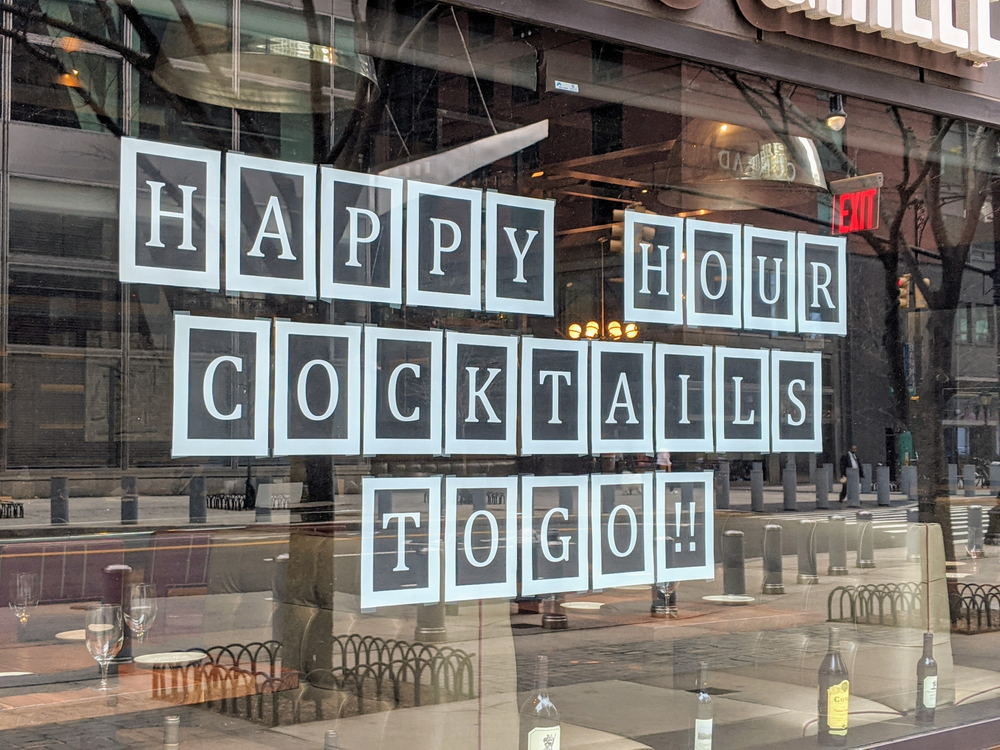The State of Takeout Cocktails
America’s piecemeal embrace of to-go drinks marks a sweeping change to the nation’s liquor laws.
The State of Takeout Cocktails
America’s piecemeal embrace of to-go drinks marks a sweeping change to the nation’s liquor laws.

Some states are making to-go cocktails permanent.by otradnaya_marina/Shutterstock
Before the pandemic, to-go cocktails were mostly just a plot point in an incoherent story your friend told after returning home from a Hurricane-fueled weekend in New Orleans. After the pandemic, though, in large swaths of America, to-go cocktails will be here to stay.
With pandemic restrictions easing in much of the country, more than a third of states have already approved measures that will allow bars and restaurants to keep selling takeout cocktails and other alcoholic drinks long after bars and restaurants reopen to full capacity. And that list is all but guaranteed to grow before most state legislatures adjourn for the summer.
The intricacies of US liquor laws—which can vary by state, county and even city or town—are enough to make you reach for a drink. But taken together, the current legislative trend marks arguably the most sweeping change to those laws since Congress pressured states to increase the drinking age to 21 more than three decades ago.
Generally speaking, the 50 states currently fit into one of three categories when it comes to their residents’ ability to buy an adult beverage from a bar or restaurant and walk out the door (or away from the window) with it: those that stood firm against to-go cocktails during the pandemic, those that gave the temporary OK and those that have since turned that short-term greenlight into a permanent one. According to data from the Distilled Spirits Council, a liquor industry trade group with good reason to track such things, those three categories currently look like so:
To-Go for Good: Arizona, Arkansas, Iowa, Florida, Georgia, Kansas, Kentucky, Montana, Nebraska, Ohio, Oklahoma, Texas, West Virginia, Wisconsin and the District of Columbia
To-Go for Now: California, Colorado, Connecticut, Delaware, Hawaii, Illinois, Louisiana, Maine, Massachusetts, Maryland, Michigan, Mississippi, Missouri, Nevada, New Hampshire, New Jersey, New York, North Carolina, Oregon, Pennsylvania, Rhode Island, Tennessee, Vermont, Virginia and Washington
Not Now (Not Ever?): Alabama, Alaska, Idaho, Indiana, Minnesota, New Mexico, North Dakota, South Carolina, South Dakota, Utah and Wyoming
(Note: Just because you can legally buy a to-go cocktail doesn’t mean you can legally drink it on the street. Open-container laws remain on the books in most of America. Put another way: Your friend still has good reason to return to the French Quarter of New Orleans after he’s vaccinated.)
The middle group is the one to keep an eye on. It includes states that are likely to soon make takeout cocktails permanent, such as Oregon and Missouri, where state lawmakers recently passed legislation that just needs their governor’s signature to become law; states like New York and Connecticut, where permanent measures are under consideration, but their passage is not guaranteed; and states that have extended the temporary measures for more than a year, including Illinois (through the end of 2023) and Maryland (through June 2023).

The takeout trend started early in the pandemic, as states moved to limit in-person dining and drinking when COVID-19 cases began to climb. New York was the first state to OK to-go sales in an attempt to lessen the financial hit those establishments were taking. Nearly three dozen states eventually followed suit in some form or another.
Booze is the most profitable thing most bars and restaurants sell, as liquor and cocktails typically offer even higher margins than beer or wine. And while to-go sales helped ease the financial pain those places felt, they did not completely eliminate it. According to industry figures from the National Restaurant Association, roughly 90,000 US bars and restaurants closed their doors for the long-term or forever during the pandemic. The pain is likely to linger, too, given Americans may not be as eager to pack into a cramped bar as they were before the pandemic. As one cocktail bar owner told Oregon lawmakers ahead of last week’s passage of its to-go law: “Anything that can help with our bottom line… could be the difference between survival and insolvency.”
How many more states move to extend to-go sales may come down to the nuances of their current distribution laws, which vary widely across the country. In Oregon, for instance, state law requires bars and restaurants to buy their booze from the same stores that consumers do. For Oregon liquor stores, then, to-go cocktails are less of an existential crisis and more of a minor inconvenience, which explains why the stores were relatively restrained in their opposition. But it’s a different story in a place like Massachusetts, where alcohol sales are closer to a zero-sum game between bars and restaurants and state-permitted liquor stores, which have to date managed to block a proposed to-go extension.
It’s not all about money, however. Public health groups have also raised concerns that to-go booze can be a recipe for disaster. In Connecticut, where lawmakers are considering their own extension, the state’s Department of Mental Health and Addiction Services has warned that to-go service—which in many places also means delivery service—is making it easier for teenagers to get their hands on alcohol.
There’s also the non-trivial fact that the past 15 months have been particularly booze-filled for many of us. According to a survey from the American Psychological Association, nearly a quarter of Americans said they were drinking more than usual to help deal with pandemic stress—a share that doubled for parents of young children. Now, as the case count drops and vaccination rate increases in the US, Americans are turning to alcohol to celebrate—often at the urging of businesses and with the blessing of government officials. Illinois’ temporary takeout extension, for instance, came with a “beer and a shot” provision that allows bars to give vaccinated customers a free drink. Anheuser-Busch, meanwhile, promised this week to give out a free round of beer once 70 percent of Americans are partially vaccinated.
To-go drinks or not, then, many Americans are likely to wake up in a post-pandemic world much the same as they did during it: hungover.
Follow us
This work is licensed under a Creative Commons Attribution-NoDerivatives 4.0 International License.
Want to republish a Modern Farmer story?
We are happy for Modern Farmer stories to be shared, and encourage you to republish our articles for your audience. When doing so, we ask that you follow these guidelines:
Please credit us and our writers
For the author byline, please use “Author Name, Modern Farmer.” At the top of our stories, if on the web, please include this text and link: “This story was originally published by Modern Farmer.”
Please make sure to include a link back to either our home page or the article URL.
At the bottom of the story, please include the following text:
“Modern Farmer is a nonprofit initiative dedicated to raising awareness and catalyzing action at the intersection of food, agriculture, and society. Read more at <link>Modern Farmer</link>.”
Use our widget
We’d like to be able to track our stories, so we ask that if you republish our content, you do so using our widget (located on the left hand side of the article). The HTML code has a built-in tracker that tells us the data and domain where the story was published, as well as view counts.
Check the image requirements
It’s your responsibility to confirm you're licensed to republish images in our articles. Some images, such as those from commercial providers, don't allow their images to be republished without permission or payment. Copyright terms are generally listed in the image caption and attribution. You are welcome to omit our images or substitute with your own. Charts and interactive graphics follow the same rules.
Don’t change too much. Or, ask us first.
Articles must be republished in their entirety. It’s okay to change references to time (“today” to “yesterday”) or location (“Iowa City, IA” to “here”). But please keep everything else the same.
If you feel strongly that a more material edit needs to be made, get in touch with us at [email protected]. We’re happy to discuss it with the original author, but we must have prior approval for changes before publication.
Special cases
Extracts. You may run the first few lines or paragraphs of the article and then say: “Read the full article at Modern Farmer” with a link back to the original article.
Quotes. You may quote authors provided you include a link back to the article URL.
Translations. These require writer approval. To inquire about translation of a Modern Farmer article, contact us at [email protected]
Signed consent / copyright release forms. These are not required, provided you are following these guidelines.
Print. Articles can be republished in print under these same rules, with the exception that you do not need to include the links.
Tag us
When sharing the story on social media, please tag us using the following: - Twitter (@ModFarm) - Facebook (@ModernFarmerMedia) - Instagram (@modfarm)
Use our content respectfully
Modern Farmer is a nonprofit and as such we share our content for free and in good faith in order to reach new audiences. Respectfully,
No selling ads against our stories. It’s okay to put our stories on pages with ads.
Don’t republish our material wholesale, or automatically; you need to select stories to be republished individually.
You have no rights to sell, license, syndicate, or otherwise represent yourself as the authorized owner of our material to any third parties. This means that you cannot actively publish or submit our work for syndication to third party platforms or apps like Apple News or Google News. We understand that publishers cannot fully control when certain third parties automatically summarize or crawl content from publishers’ own sites.
Keep in touch
We want to hear from you if you love Modern Farmer content, have a collaboration idea, or anything else to share. As a nonprofit outlet, we work in service of our community and are always open to comments, feedback, and ideas. Contact us at [email protected].by Josh Voorhees, Modern Farmer
June 4, 2021
Modern Farmer Weekly
Solutions Hub
Innovations, ideas and inspiration. Actionable solutions for a resilient food system.
ExploreExplore other topics
Share With Us
We want to hear from Modern Farmer readers who have thoughtful commentary, actionable solutions, or helpful ideas to share.
SubmitNecessary cookies are absolutely essential for the website to function properly. This category only includes cookies that ensures basic functionalities and security features of the website. These cookies do not store any personal information.
Any cookies that may not be particularly necessary for the website to function and are used specifically to collect user personal data via analytics, ads, other embedded contents are termed as non-necessary cookies.